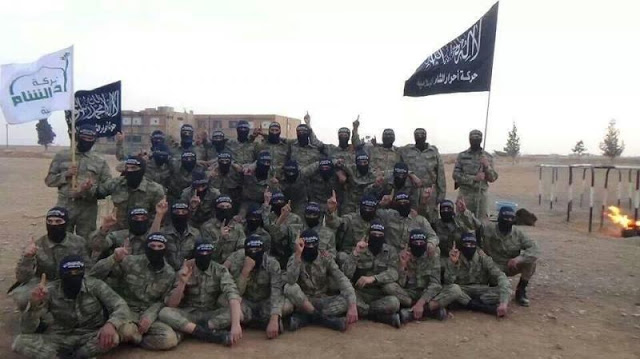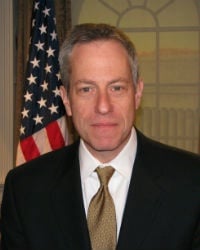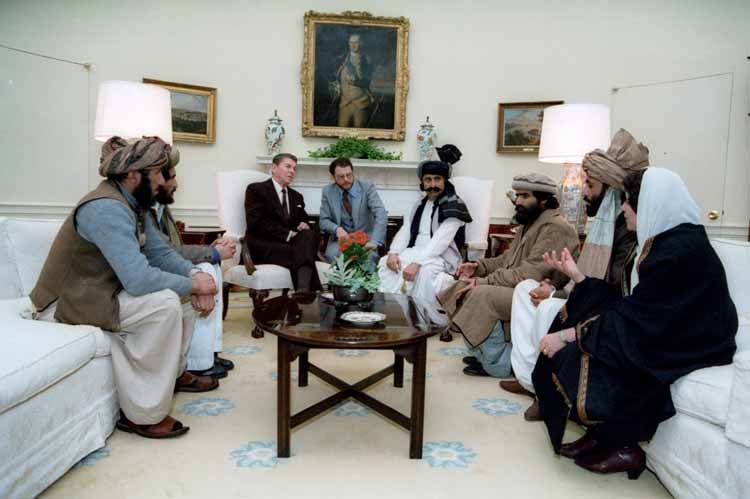
Written by Prof Michel Chossudovsky; Originally appeared at Globalresearch
“A senior figure from a Syrian rebel group with links to al Qaida was allowed into the United States for a brief visit, raising questions about how much the Obama administration will compromise in the search for partners in the conflict.” McClatchy, May 21, 2016
Labib al Nahhas is known as the foreign affairs director for the Islamist fighting group Ahrar al Sham. He visited Washington in December. The leader of a terrorist entity linked to Al Qaeda was granted entry by US immigration:
That suggests that authorities granted him entry at a time when U.S. immigration authorities face political pressure to block visitors with even tenuous ties to extremist groups. Four months after Nahhas entered the United States on a European passport, U.S. authorities denied entry to a well-known Syrian humanitarian leader who had been approved to visit Washington to receive an award from international aid groups. McClatchy
While the purpose of his visit was not disclosed, the report nonetheless intimates that he was in Washington for talks with US government officials. “His previously undisclosed visit is a delicate matter for both sides – the conservative Salafist insurgents risk their credibility with even perceived ties to the United States, and the U.S. government risks looking soft on screenings by allowing entry to a member of an Islamist paramilitary force.”
Moreover, shortly prior to his visit to Washington, Nahhas together with other rebel leaders met with Michael Ratney (image right), U.S. State Department special envoy for Syria, in Istanbul on December 5, 2015.
Was this Istanbul meeting intended to establish the groundwork for further consultations with the jihadist leader in Washington DC?
The report suggested that the Ahrar al Sham “moderate” terrorist leader (who appears to have the profile of a US “intelligence asset”) would be meeting with “third parties” in Washington DC ”who might influence policymakers” –e.g. D.C. think tanks, research institutes, media, US intelligence, etc. as well as ”lobbyists and Middle East researchers”.
The State Department declined to answer whether any U.S. officials knew in advance or expressed reservations about Nahhas’s presence in Washington, or whether State Department officials had assisted his entry.

In this image posted on the Twitter page of Ahrar al-Sham on May 6, 2016, an Ahrar al Sham fighter guards the front lines of Breidige village in northwest Syria. Unlike the Islamic State group and al-Qaida’s branch in Syria, the Nusra Front, Ahrar al-Sham is not on the U.S. list of terrorist organizations.
National security analysts say U.S. authorities likely knew of Nahhas’ arrival – intelligence agencies for years have watched his group’s interactions with al Qaida’s Syrian branch, the Nusra Front.
“They could make, quickly, the decision that he’s persona non grata in the United States and yet they haven’t.” Faysal Itani, a Syria specialist with the Atlantic Council’s Rafik Hariri Center for the Middle East
Links to al Qaeda
Nahhas denies his affiliation to al Qaeda:
“We have been falsely accused of having organizational links to Al-Qaeda and of espousing Al-Qaeda’s ideology. Nothing could be further from the truth.”
According to Charles Lister (Brookings):
These are bold words [above] from such a senior Ahrar al-Sham official, … , this author still finds it nearly impossible to get any group, including those already successfully “vetted” by the United States, to commit to condemning Jabhat al-Nusra in front of others, Syrian or foreign.
So was Nahhas’ omission of Jabhat al-Nusra merely an extension of this broader reality? Thus far, it would seem so. By explicitly singling out al-Qaida, Nahhas was distinguishing its Syrian affiliate, or at least much of the 60 to 70 percent Syrian portion of it, as still being a potential partner [al Nusra] in a broader and more medium-term Syrian project.Brookings, July 14, 2015
In this regard, the McClatchy report confirms that
The group’s ultimate vision is Islamist rule for Syria and its old links to al Qaida are no secret: One of the group’s founders, Abu Khalid al Suri, was memorialized by al Qaida leader Ayman al Zawahiri after his death in a bombing.
By all accounts, Ahrar al Sham is much more ideologically diverse than al Qaida, encompassing members ranging from followers of a more moderate, Muslim Brotherhood-style Islamism to Salafist jihadists whose beliefs are virtually identical to al Qaida’s.
“They’re not al Qaida but they are Salafi jihadists – they’re just not transnational ones,” Itani said of Ahrar al Sham. (McClatchy, op cit)
Al Qaeda goes to Washington! This should come as no surprise. It’s part of a routine. US officials have been working hand in glove with Al Qaeda since the onslaught of the war on Afghanistan in 1979.





genial, fututistic probably expressionist dadaist fauvism of foreign policy decisions….I am beginning to wonder what kind of HARD DRUGS are being smoked in Washington, Langley and everywhere else these days…..
only SUPREME IDIOTS could possibly trust having allies like these…especially after the ABYSMAL FAILURES of the past…
the sooner Trump gets to the White House the better for the entire planet, its obvious te “intellighenzia” in Washington is totally putrified….